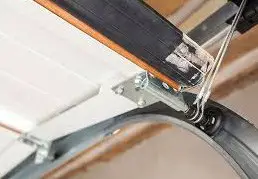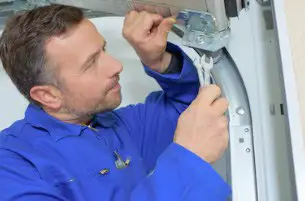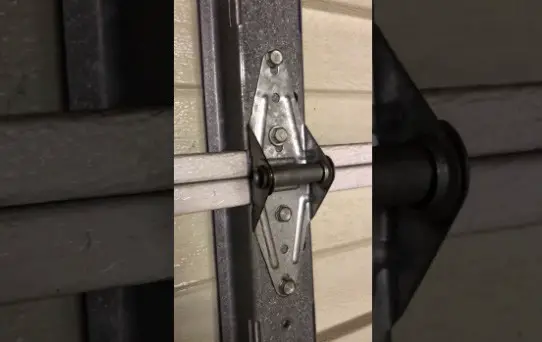Not many people try to fix a noisy garage door. A reason is that people think it may cost a fortune to fix the noises that their garage doors make.
Some people even think that it’s normal for a garage door to make a lot of noise.
Well, it’s only normal to a certain extent. Older garage doors tend to make more noise than newer models due to better technology.
Noisy garage doors are actually pretty common nowadays because people usually don’t care to fix it.
When I was a boy, I used to know when my dad was home from work because the garage door would squeak and vibrate in a tone that was audible all through the house.
I always used the garage door as my alarm telling me that my parents were home.
It was perfect because my parents never did fix that noisy garage door, so I used it to my advantage.
I’m a lot older now and no longer live at home. I have surprisingly run into this same problem with my own garage door, which made me look into the issue further.
I took the time and researched many different problems that could be causing the excess noise. Here is a list of 12 simple tricks to fix a noisy garage door that you can try at home.
1. Inspect the Track or Rails of Your Garage Door

This is one of the easiest things you can first do to fix your noisy garage.
Most garage doors either have rails on the sides of the door or a track in the middle.
Where you inspect will solely depend on what type of garage door you have. I personally have an older-style garage door that has a track right in the middle.
Use a ladder or a step stool to inspect the track for any debris, dirt, rocks, gravel, or anything else that can prevent your garage door from opening and closing smoothly.
Having sand or dirt with pebbles stuck in the tracks will cause lots of excess noise that shouldn’t be present.
Inspect and clean the tracks thoroughly to make sure your garage door can move easily with little effort. I recommend cleaning out the tracks and rails with a dirt and debris dissolving agent such as WD-40.
2. Replace Broken or Worn Rollers
Rollers are the bread and butter when it comes to your garage. Having broken or worn-out rollers is a common reason for a loud garage door.
Broken rollers can even cause the garage door to not open properly at all. It’s a good thing this is a pretty inexpensive fix.
If your rollers are not broken or worn out, you can still benefit from changing them out.
I recommend changing out your rollers for these nylon rollers because they are much quieter and stronger than the traditional ones.
These rollers come with sealed bearings that are excellent at keeping dirt and debris out.
Simply take a look at your garage’s existing rollers. If the bearings are exposed and filled with dirt, then it is most likely time to replace them.
You may even notice a roller may not even be spinning anymore due to the bearing being shot from excess dirt.
Another sign of wear and tear is if your rollers don’t look as round as they should. The constant opening and closing on a dirty track can start to deform the rollers.
If you are worried that you won’t be able to change out the rollers on your own, you can take a look at this video that shows you how how to do it step by step.
With a little confidence, you should have your rollers replaced with little effort.
3. Find and Tighten Loose Hardware

The main infrastructures that your garage door sits on are nuts and bolts.
The constant movement of opening and closing can cause a lot of vibration.
These vibrations and movements will start to loosen different parts of your garage after an extended period of time. This isn’t something that will happen overnight.
This can happen over a period of many months or, more commonly, after a few years.
Most of the hardware that you will see are nuts and bolts. You can use either a socket wrench or an adjustable wrench, depending on the situation.
There might be a few hard-to-reach areas for you to tighten, but overall it shouldn’t be too difficult.
Loose hardware in your garage can cause it to have unnecessary movement, which can lead to rattling and creaking. This is a very simple fix that you can accomplish in under an hour.
Simply start at one side of your garage and make your way to the middle and then to the other side.
4. Replace Worn or Missing Insulation Strip at the Bottom of the Garage Door
Many garage doors will have a strip of rubber insulation at the very bottom of the door. The main purpose of this rubber strip is to make sure the door closes quietly and with a good seal.
A good seal at the bottom of the door will help keep excess wind noise out of your garage, as well as dirt and bugs.
If you have a missing or damaged insulation strip, then your garage will be much louder once it completely closes.
This is because the strip also acts as a buffer to absorb shock when the bottom of the garage door hits the ground.
This weatherstripping rubber insulation from amazon is specifically designed to be used on garage doors and will work great as a direct replacement to your existing weatherstrip.
Installation is fairly simple with this specific product. It is a universal insulation that works on almost any garage door. All you have to do is cut it to the correct size to fit your garage door.
If you have a garage door that opens outward, then the shock from shutting doesn’t really apply to you, as the garage door simply brushes past the floor instead of actually resting on it.
You will still benefit from installing this on your garage door even if it opens outward because of the tight seal it creates.
5. Inspect and Replace Bad Springs on Your Garage Door
Some garage door models will have springs installed on the sides of the door or in the middle.
These springs help open and close your garage as well as prevent it from slamming shut when it is closing. As time goes by, these springs can start to wear out and become not as strong as they once were.
This can result in the harder closing, difficult opening, and excess noise from a bad or faulty garage door spring.
Inspect your garage spring to see if you see any defects with it. A spring that is not completely broken may be harder to diagnose, so you may have to open and close your garage a few times to see how it looks when it’s in use.
If your springs look like they need to be replaced, then you can take note of the spring’s size and go to your local hardware store.
Once you have found a replacement spring, you can watch the video below on the tools needed and how to replace the springs yourself.
You can save hundreds of dollars doing it yourself rather than hiring a professional to do it for you.
If you have fully inspected the springs and they look to be in good working condition, then it would benefit you to spray them with lubrication to help prevent excess noise.
6. Lubricate Your Garage Door with the Right Lubricant
There are essentially two ways to lubricate your garage door. There’s the right way and then there is the wrong way. Many people tend to make the mistake of using the incorrect lubricant on their garage door.
WD-40 is a well-known multi-use spray that can fix just about any issue.
Ever heard someone say to just spray some WD-40 in it and the problem will be fixed? Using it on your garage door to clean and lubricate it will work, but only for a short period of time.
WD-40 will only lubricate your garage door for so long because it isn’t a true lubricating agent with oil. Its main use is as a solvent or a dirt and debris remover. This means it excels at cleaning a surface.
I first recommend cleaning your garage tracks and springs with WD-40 and then applying garage door lubricant shortly after.
This oil-based lubricant was designed specifically for a garage door and will last you a very long time.
You never want to lubricate a dirty surface because that can make it worse.
Lubricating an area that is filled with dirt and debris can cause it to gunk up even worse than it already is.
7. Inspect and Properly Adjust Your Garage Door’s Locking Mechanism
Another thing that can cause a noisy garage is its locking mechanism. A slight misalignment can cause your garage door to operate at very loud and unstable levels.
It can cause creaking, shaking, bending, and sometimes even damage in the worst-case scenario.
The easiest way to observe this is to watch the locking mechanism on your garage door as you open and close it a few times.
If it doesn’t look straight or starts to wobble at certain points during operation, then you may have a misaligned garage door.
Something may be loose or, in a worse situation, bent. It’s always possible to fix your garage door’s locking mechanism by tightening the bolts and screws accordingly, but if it’s broken or defective, then you may need a professional for help with a replacement.
8. Inspect Your Garage Door’s Hinges

This is another area of your garage door that will need to be maintained over a period of time.
If you have a newer style garage, then you can find the hinges usually connected to your garage door’s rollers and at the folding areas of your garage door.
Take the time to inspect every hinge on your garage door for signs of excessive wear, bending and cracks.
If your hinges look fine, then simply give all of them a nice tightening.
Loose garage door hinges can cause excess vibration and rattling, which can be very noisy.
It would also be wise to lubricate all the moving areas on the hinges as well for the best chance of reducing unwanted noise. You can find garage door hinges fairly cheap at your local hardware store.
I have also found a great video that teaches you how to replace the hinges yourself to save a lot of money.
9. Change Your Garage Door Opener

This is probably also the most expensive option on top of using a professional.
If your garage door is still making a lot of noise after making sure everything is tight, cleaned, and lubricated, then your actual garage door opener may be the issue.
The older garage door opener tends to be a lot noisier just because of the older technology in the motors.
Garage door openers that operate on metal chains also tend to be a lot noisier than openers that are belt driven.
If you are contemplating changing out your entire garage opener, then I highly suggest you to replace it with a quiet and strong belt-driven opener like this one from amazon.
You can’t get any quieter than a belt-driven garage door opener, and this one does it well.
10. Change Your Entire Garage Door and Opener System
If you are unable to change just your garage door opener due to an outdated garage door, then you may want to look into replacing everything together.
I said replacing your garage door opener can be costly, but replacing everything from the opener to the door to the tracks, rails, and hinges will be an expensive project.
I only recommend looking into this route if you have a very old garage that needs to be replaced.
This project would most likely take a trained professional, which can add up to a lot of money for parts and labor.
11. Implement Routine Maintenance
Don’t wait for your garage door to start making all kinds of creaking and rattling noises before you decide to take a look at it.
You should be incorporating routine maintenance for your garage door at least once a month.
Inspecting your garage door at least once a month will help you identify problems before they can cause costly damage or expensive repairs.
By doing regular maintenance like cleaning the track, lubricating moving parts, and tightening loose hardware, you will not only reduce the amount of noise your garage door will make, but you will also give it a longer life.
12. Call a Professional
Many of the tips I have provided in this article are pretty easy to do. However, there are a few that may require professional assistance if you don’t have enough courage to do it yourself.
You may be able to perform easy tasks like lubricating, tightening loose hardware, and installing weatherstripping, but when it comes to hardware replacement, you may be stumped.
If you have performed as many of these tasks as you feel safe doing, then it may be time to hire a handyman or professional if your garage door still needs work.
A professional will also be able to give you some additional advice based on the current situation of your garage door.
Final Thoughts
There are a number of reasons your garage door can be making noise.
If you take the time to incorporate proper maintenance for your garage door, then you may be able to prevent a lot of these issues from happening.
Regular lubrication and checking for loose hardware are the two top ways to give your garage door the longest life possible, as well as keep it quiet at the same time.
The only other thing I recommend doing to your garage door is adding weatherstripping.
If your garage door doesn’t already have weatherstripping at the bottom of the door, then this would be a great addition.

